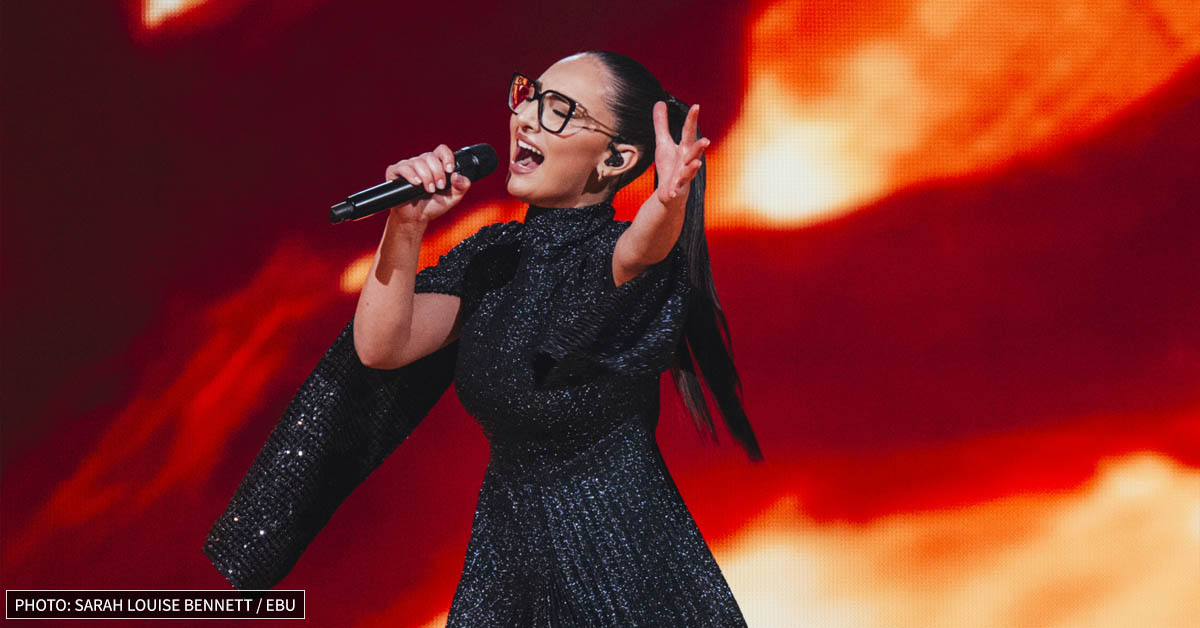
The Greek national broadcaster ERT has officially announced that 264 songs were submitted for “Ethnikos Telikos 2026”, which will determine Greece’s entry for Eurovision 2026 in Vienna, Austria.
The Greek national broadcaster ERT revealed last night that 264 songs have been submitted for “Ethnikos Telikos 2026”, through which Greece will choose its entry for Eurovision 2026, to be held in Vienna, Austria. Greece will continue to select its Eurovision entry through the same national final format introduced last year, where singer Klavdia won with her song “Asteromáta” (in English: “Starry Eyes”), achieving a remarkable sixth place — Greece’s best result since 2013, when the country also placed sixth.
ERT officially announced that 264 songs were received for the 2026 competition. As reported earlier, the submission window was open from September 17th to November 2nd. Notably, over 100 songs were submitted on the final day alone, and 200 within the last five days of the submission period.
This year marks a significant increase in the number of song submissions. A total of 264 songs were sent in, compared to 187 last year — a rise of 77 entries — reflecting the growing public interest in Eurovision and Greece’s music competition.
Keren Peles for Greece?

According to an exclusive report published last night, Keren Peles has submitted a song for Greece’s national final! Keren Peles wrote a song that was submitted to the Greek pre-selection, expected to take place in February. This fascinating collaboration began earlier this summer through a partnership with the Greek Eurovision website Eurovisionfun, where Peles and the Greek production team began working jointly on the project. The creative team includes both Greek and Israeli professionals. Peles is no stranger to Greece — she owns a home on the island of Antiparos and spends considerable time there.
The involvement of Israeli songwriters in Eurovision national selections across Europe is not a new phenomenon. Still, Keren Peles’ participation in Greece’s competition, as a well-known figure representing Israeli pop culture in recent years, is expected to attract substantial media attention — and possibly spark protests from anti-Israel circles in Greece.
Relations between Israel and Greece in recent years have swung between tension and friendship. There was hostility during Eurovision 2024, particularly following the “yawning incident” involving Marina Satti. However, in Eurovision 2025, relations warmed thanks to Klavdia’s success, which received 12 points from the Israeli jury and 7 points from the Israeli public. Now, with Keren Peles taking part in Greece’s national final, the musical partnership between the two nations may continue to strengthen in the years ahead.
Expanded Format: Major Changes in the Greek National Selection
 Last year’s “Ethnikos Telikos” was a massive success within Greece and beyond, with the January 30th, 2025 broadcast achieving the highest TV ratings in Greece for 15 years. The contest’s winner, Klavdia, brought Greece an impressive sixth place at Eurovision 2025, matching the country’s 2013 achievement – one not matched until this year.
Last year’s “Ethnikos Telikos” was a massive success within Greece and beyond, with the January 30th, 2025 broadcast achieving the highest TV ratings in Greece for 15 years. The contest’s winner, Klavdia, brought Greece an impressive sixth place at Eurovision 2025, matching the country’s 2013 achievement – one not matched until this year.
According to information we got from Eurovisionfun, the “Ethnikos Telikos” expands this year to include two Semi-Finals in addition to the Final. 28 songs will compete: 14 in each Semi-Final. The outcome in the Semi-Finals will be determined solely by the public, who will select seven qualifiers from each Semi-Final for the Final. In the Final, 14 entries will compete, with voting once again split 50-50 between juries – equally divided between a domestic and an international panel – and the public. According to the broadcaster:
“Through an upgraded and open-to-all process, including two Semi-Finals and one Final, ERT moves forward with selecting the song and artist that will represent our country in the 70th Eurovision Song Contest. This follows the successful organization of last January’s national final and Greece’s excellent 6th place at Eurovision 2025, which achieved record ratings of the last 15 years. Specifically, up to 28 songs will compete across two Semi-Finals, from which 14 will qualify for the National Final, decided exclusively by the public. In the National Final, the winning song will be determined by both the audience and the juries, granting the performer the ticket to Vienna, where the 70th Eurovision Song Contest will take place in May 2026”.
Greece at Eurovision 2025
“Asteromáta” (translated as: “Eyes of Stars”) is the song performed by Klavdia, who represented Greece in the grand final of Eurovision 2025. Greece finished sixth in the grand final with 231 points.
Eurovision 2026: This will be Greece’s 46th participation in Eurovision. Greece joined the competition in 1974 and achieved its best result in Eurovision 2005 when singer Helena Paparizou won first place with the song “My Number One”.

Email: [email protected]
Phone: +972-50-9441919
Ilay Gaist is a leading Israeli content creator and writer specializing in the Eurovision Song Contest. He is a well-known commentator with extensive expertise in the contest’s history, rules, and dynamics. His passion for Eurovision drives him to deliver rich, professional, and innovative content to his audience.
Ilay holds a bachelor’s degree in Arabic and has a multilingual background. He also engages in cultural research, with a particular focus on global culinary traditions and the evolution of local cuisines around the world.

